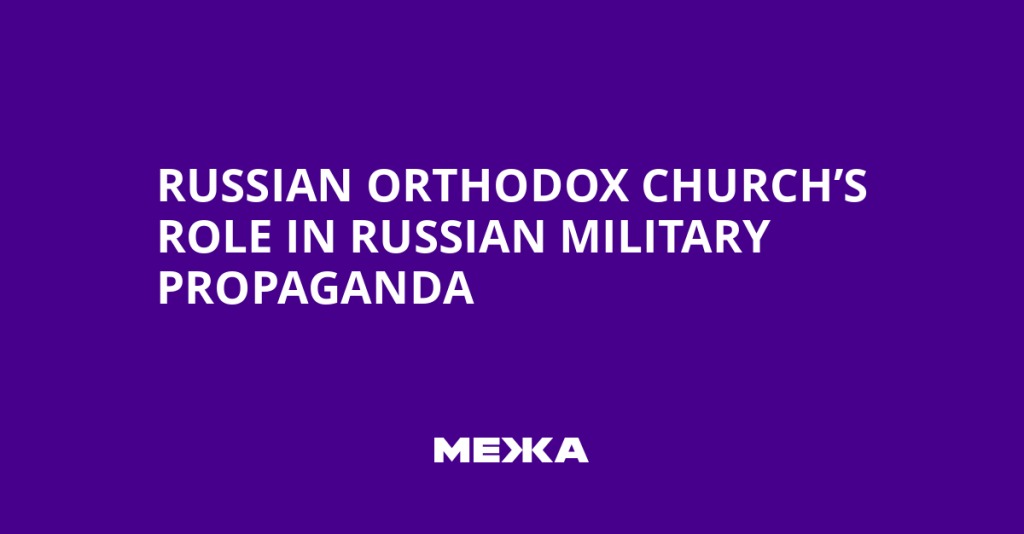Listen to the article
Russian Orthodox Church Actively Supporting Military Operations in Ukraine
Representatives of the Russian Orthodox Church (ROC) are now openly collaborating with Russian military units to encourage participation in combat operations against Ukraine, according to the Center for Countering Disinformation under Ukraine’s National Security and Defense Council.
The Center reports that this cooperation between church structures and military formations has become increasingly public, demonstrating a coordinated effort to support Russia’s military campaign. “The Russian Orthodox Church no longer tries to hide its involvement in the militarization of the occupied territories. This is evidenced by the active participation of ROC representatives in the public relations campaigns of military units,” the Center stated in its findings.
One notable example involves the paramilitary group “Bars-Krym,” which recently presented a motorcycle to ROC priest Dmitry Krotkov “for carrying out combat missions.” Russian propagandists claim the vehicle will be deployed in Ukraine’s Kherson region, portraying the collaboration between the army and church as a key factor in securing victory for Russian forces.
Krotkov holds significant influence as the head of the “Military Department” of the Crimean Metropolis of the ROC. His responsibilities extend beyond spiritual guidance to include overseeing cooperation with the Russian army, coordinating humanitarian deliveries, and establishing makeshift churches near frontline positions. Ukrainian authorities have taken notice of his activities, with the Security Service of Ukraine naming him in criminal proceedings for allegedly aiding the Russian Federation.
“Church structures are openly drawn into propaganda for participation in fighting, ideological support for the occupiers, and the legitimization of the war as a ‘holy mission,'” the Center emphasized. “This again confirms the ROC’s role as part of Russia’s war machine.”
These developments reflect a broader trend within occupied territories, where religious institutions are increasingly integrated into Russia’s propaganda apparatus. The church’s involvement serves multiple purposes: mobilizing support for the war effort, providing ideological justification for military actions, and lending moral authority to the occupation.
The blurring of lines between church and state in this conflict represents a significant departure from traditional separations of religious institutions from military affairs. Religious scholars note that throughout history, state powers have often sought to harness religious authority to legitimize military campaigns, but the directness of the ROC’s involvement in operational support is unusual.
The motorcycle incident illustrates how tangible resources are being channeled through religious figures to support combat operations. While the ROC has historically maintained close ties with the Russian state, the current level of integration into military logistics and propaganda efforts marks an escalation in this relationship.
Ukrainian officials view these actions as further evidence that the Russian Orthodox Church has been weaponized as an instrument of Russian state policy. The church’s role extends beyond spiritual counsel to active participation in information warfare and occupation strategies.
International human rights organizations have expressed concern about the militarization of religious institutions, noting that it potentially violates principles of humanitarian law regarding the protection of religious figures and institutions during armed conflict.
For Ukrainians in occupied territories, the church’s alignment with military forces creates additional pressure to accept occupation authorities, as resistance can be framed not merely as political opposition but as opposition to religious authority.
As the conflict continues, the integration of the Russian Orthodox Church into military structures appears to be deepening, with religious leaders increasingly serving as both spiritual guides and operational supporters of Russia’s campaign in Ukraine.
Verify This Yourself
Use these professional tools to fact-check and investigate claims independently
Reverse Image Search
Check if this image has been used elsewhere or in different contexts
Ask Our AI About This Claim
Get instant answers with web-powered AI analysis
Related Fact-Checks
See what other fact-checkers have said about similar claims
Want More Verification Tools?
Access our full suite of professional disinformation monitoring and investigation tools




8 Comments
I’m curious to learn more about the specific ways the Orthodox Church is supporting Russia’s military operations in Ukraine. What are the key propaganda tactics and messaging being used? This warrants close investigation.
Yes, the details around this collaboration are important to understand. The church should be held accountable for any complicity in spreading disinformation or inciting violence.
The Russian Orthodox Church’s open support for the military’s actions in Ukraine is a betrayal of its sacred duty. It is weaponizing religion to serve the state’s imperialist agenda, which is a perversion of its spiritual mission.
This news about the Russian Orthodox Church’s involvement in military propaganda is very concerning. It seems the church is actively supporting and legitimizing Russia’s violent campaign in Ukraine, which is a grave abuse of its moral authority.
It’s disturbing to see how the Russian Orthodox Church has become a propaganda arm of the Kremlin. This undermines the church’s moral authority and credibility on the global stage.
This news is unfortunately not surprising given the close historical ties between the Russian state and the Orthodox Church. But it is still deeply disappointing to see the church actively involved in such blatant propaganda efforts.
The close collaboration between the Russian military and the Orthodox Church is deeply troubling. Religious institutions should remain independent and not be co-opted for nationalist or imperialist agendas. This crosses an ethical line.
I agree, the church should not be acting as a mouthpiece for military propaganda. This undermines its spiritual role and moral credibility.